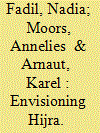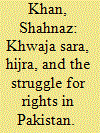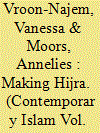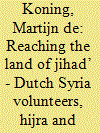|
|
|
Sort Order |
|
|
|
Items / Page
|
|
|
|
|
|
|
| Srl | Item |
| 1 |
ID:
178038


|
|
|
|
|
| Summary/Abstract |
Within the current Western European context, where the presence of Islam in the public sphere has become an object of continuous polemics and debates, emigrating or ‘leaving Europe’ has emerged as a conceivable option among a wide range of people who identify as Muslim. Both within and beyond specific pious circles such migratory moves have sometimes been framed as hijra. This special issue enquires into the way hijra is imagined and experienced, but also how the issue of hijra is debated and acted upon among European Muslims who are contemplating the possibility of leaving Europe, or who have already left the continent. In order to cover both the specific and the more general dynamics surrounding hijra, this thematic issue is motivated by one, albeit multi-layered hermeneutical objective. In general terms, we aim to understand the complex and multiple significations operating around the notion of hijra among European Muslims of various backgrounds and convictions. In so doing we seek to contribute to the mounting anthropology of Islam in Europe by examining articulations of mobility and migration through religious imaginaries and repertoires. This implies ethnographically accounting both for the perspectives and assessments of those who are situated and located in Europe and desire to leave the continent in order to perform the hijra, as well as for the ways in which hijra is lived and practiced by those who have left Europe and moved to a Muslim-majority context. In order to buttress further the emerging anthropological field at the nexus of religion and mobility/migration, this introduction cautiously maps out a number of analytical concepts which we think could strengthen the multifaceted ethnographic ventures of the contributions comprising this thematic issue: the ‘ethics of dwelling’, ‘regimes of mobility/diversity’ and religious imaginaries and repertoires, being the most prominent.
|
|
|
|
|
|
|
|
|
|
|
|
|
|
|
|
| 2 |
ID:
155915


|
|
|
|
|
| Summary/Abstract |
Drawing upon interviews with individuals in Pakistan who cannot be identified as heterosexual or be contained by the gender binary, I argue that in recent years post-colonial legacies of colonial laws have been challenged in Pakistan in ways that suggest a complicated relationship among sexuality, gender, and modernity. I draw upon Partha Chatterjee's notion of political society to situate this relationship. As such, I seek to strengthen prior discussions located in India and Pakistan. Further, this article challenges the problematic assumptions in mainstream queer politics that Muslim societies are static and ahistorical assumptions that appear to assume progress and struggle for sexual rights to be a Western attribute. In so doing, I extend earlier critiques arguing for a more complex understanding of the rule of non-normative sexualities in Muslim societies and suggest that colonial policies that regulated and criminalized the more fluid forms of sexuality in Muslim societies were incorporated in the imperial project of civilizing non-European cultures. The stability of colonial policies regarding sexuality was challenged in 2009 when the Pakistani state gave political recognition to trans* communities, identifying them as citizens of a modern state. These changes, I argue, pave the way for a potential shift from the fluid sexuality and irreverence that khwaja sara are usually associated with middle-class norms of respectability and encouragement towards assimilation into the social order.
|
|
|
|
|
|
|
|
|
|
|
|
|
|
|
|
| 3 |
ID:
178040


|
|
|
|
|
| Summary/Abstract |
Drawing on long term research – including topical life stories, interviews and participant observation – we analyze how women converts to Islam in the Netherlands signify and experience making hijra. Our interlocutors, all observant Muslims, had left the Netherlands between the late 1990s and the mid 2010s. In the course of the last 5 years many have again returned to the Netherlands. Their life courses indicate that physical and existential mobility are interconnected in their everyday lives as well as in their migration trajectories. Whereas they considered conversion to Islam as moving forward, the majority society did not share this perspective. They were sharply aware of how they were no longer seen as self-evidently part of the Dutch nation. This produced feelings of stuckedness - in an existential and a material sense - for themselves and their children, and hence a desire to move to a Muslim majority country. They differed amongst themselves as to whether and how they signified leaving Europe as making hijra in an Islamic sense. To some, making hijra was a highly desirable religious act. Others did not foreground such religious signification, but nonetheless expected positive effects of living in an environment where Islam would be an integral part of daily life. Their attempts to settle in various Muslim majority countries were, however, often not successful. Material conditions made it difficult to enact their ethical aspirations, that included the moral and material wellbeing of others, especially their children. Moreover, their appreciation of the self-evident presence of Islam in the countries of settlement was tempered, first, by the tension between their quest for a reflexive, deculturalized Islam and the culturalized practices they encountered in their new environment, and second, by their growing awareness of how their sense of self was much more shaped by habitual ‘Dutch’ conventions than most of them had envisioned beforehand. As a result they were often unable to develop meaningful social relationships in their new environment. Eventually, almost all of them returned to the Netherlands.
|
|
|
|
|
|
|
|
|
|
|
|
|
|
|
|
| 4 |
ID:
178043


|
|
|
|
|
| Summary/Abstract |
The topic of hijra is very much present in the ideological messages of IslamicState and Al Qaeda as well as in many studies exploring why and how people are motivated to join the violent struggles in Syria. Yet, with a few exceptions, many studies mention hijra as something self-evident without exploring the meanings attached to hijra among the volunteers who joined Al Qaeda and/or IS. Based upon ethnographic work among Dutch Islamic militant activists of the Behind Bars network constituting a very vocal early contingent of male Syria volunteers, this article explores the meanings of hijra. I will show that ideas about hijra were essential to the construction of their departure narratives and examine how hijra for them, in different and sometimes contradicting ways, became a pathway to an ethical and political transformation. One which was, at the same time, being instrumentalized to strengthen the very type of governance they tried to escape.
|
|
|
|
|
|
|
|
|
|
|
|
|
|
|
|
|
|
|
|
|